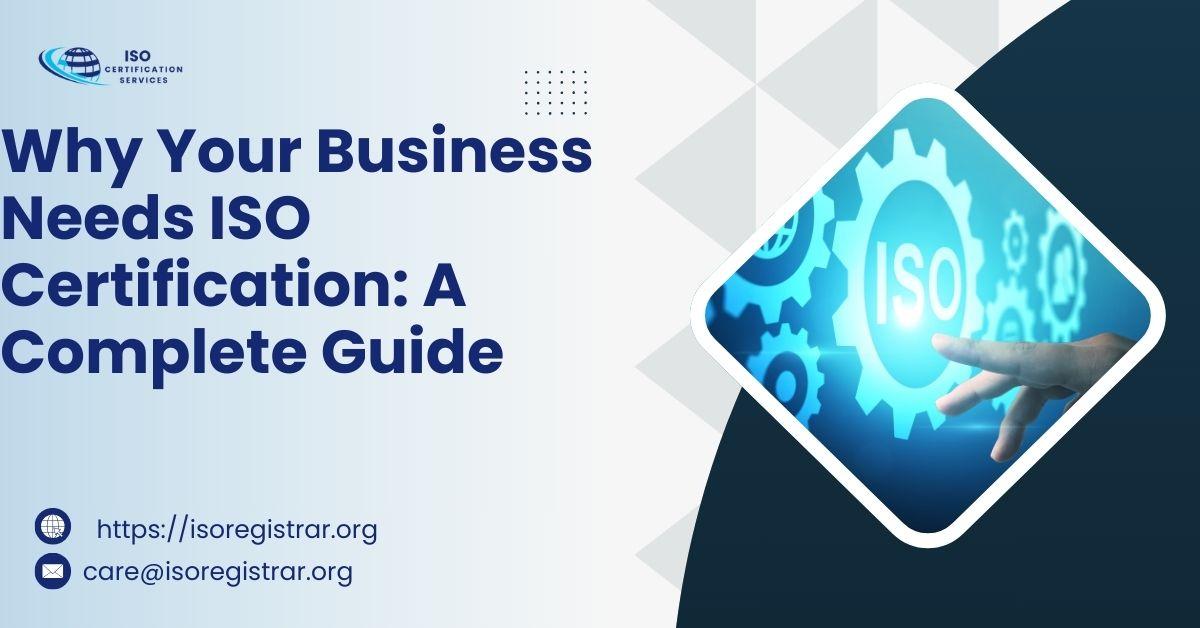Notifications

8 minutes, 26 seconds
-27 Views 0 Comments 0 Likes 0 Reviews

Why Your Business Needs ISO Certification: A Complete Guide
In today’s competitive business world, standing out from the crowd is crucial. Whether you’re a small startup or an established company, having a good reputation and a solid foundation for your operations can make a big difference. One way to achieve this is by getting ISO certification.
ISO stands for the International Organization for Standardization. It’s an independent, non-governmental international body that develops and publishes standards. These standards cover a wide range of fields, from quality management and environmental practices to information security and energy management.
When a business is ISO certified, it means that the company’s processes, systems, and practices meet the high standards set by ISO in a particular area. There are many types of ISO certifications, such as ISO 9001 (for quality management), ISO 14001 (for environmental management), and ISO 27001 (for information security).
Before diving into the benefits of ISO certification, let’s quickly look at some of the most common types of ISO certifications businesses may seek:
ISO 9001: This is the most widely recognized and popular ISO certification. It focuses on quality management systems (QMS), ensuring that your company’s products and services meet customer expectations and regulatory requirements.
ISO 14001: This certification is about environmental management. It shows that your business is committed to reducing its environmental impact through sustainable practices.
ISO 27001: This certification focuses on information security management. It ensures that your company keeps sensitive data secure and complies with data protection regulations.
ISO 45001: This focuses on occupational health and safety management, ensuring that your workplace is safe and your employees are protected.
ISO 22000: This certification is for businesses in the food industry and focuses on food safety management.
There are numerous reasons why obtaining ISO certification can help your business grow, improve, and succeed. Let’s break down the key benefits:
One of the most significant advantages of ISO certification is that it helps your business improve its quality management systems. With an ISO-certified system like ISO 9001, you’ll establish clear processes and guidelines to ensure that your products and services meet a high standard every time.
By following ISO’s well-defined guidelines, you’ll reduce the risk of mistakes, waste, or inconsistencies in your products. This improves customer satisfaction, boosts repeat business, and builds a solid reputation for delivering quality products or services.
When you’re ISO-certified, it shows customers that your business follows international best practices and is committed to delivering high-quality products and services. This boosts customer trust and satisfaction, making them more likely to choose your company over competitors.
ISO certification provides customers with proof that your company can consistently meet their needs and expectations, which is essential in gaining their loyalty. With satisfied customers, your business will see increased demand and improved sales.
ISO standards help businesses streamline their operations by identifying inefficiencies and offering clear procedures for improvement. With an ISO-certified system, your business can:
Reduce waste: By following optimized processes, your company can minimize unnecessary waste, saving money on raw materials and resources.
Save time: Having well-defined processes makes it easier for employees to know their roles and tasks, leading to quicker and more efficient work.
Minimize errors: By reducing mistakes, your business saves money on correcting problems and dealing with customer complaints.
In short, ISO certification can lead to better use of resources, less waste, and lower operational costs, which will boost your business’s profitability.
Being ISO certified sends a strong message to your clients, partners, and competitors that your business is committed to maintaining high standards. It shows that you’re serious about continuous improvement and quality assurance.
In competitive markets, many customers and partners prefer working with businesses that hold ISO certifications because it guarantees a certain level of professionalism and consistency. This can give your company a competitive edge over others in your industry, especially when you’re bidding for contracts or dealing with large customers.
ISO certification is recognized globally, which opens up new opportunities for your business to enter both domestic and international markets. Many companies, especially larger organizations, require their suppliers to be ISO certified, particularly when dealing with international trade.
If you plan to expand or collaborate with larger companies, ISO certification can help your business gain access to new markets, as many government bodies and private companies prefer to do business only with ISO-certified suppliers.
Now that you understand the importance of ISO certification, you may be wondering how to go about getting your business certified. While the process may vary slightly depending on the type of ISO certification, here’s an overview of the general steps involved:
Choose the Right ISO Standard: Select the ISO standard that fits your business needs and aligns with your goals.
Visit the Certification Portal: Go to the official ISO certification website.
Fill Out the Application Form: Complete the online form, ensuring all details are accurate.
Submit Your Application: Review, submit, and double-check all details.
Payment: After submitting the form, pay the nominal charges.
Certificate Confirmation: A consultant confirms the ISO standard you're applying for.
Receive Your ISO Certificate: Once it’s approved, your ISO certificate will be sent to your registered email.
NOTE:- Apply for ISO CERTIFICATION 9001 : 2015
ISO certification is more than just a seal of approval; it’s a powerful tool that can transform your business. From improving quality and customer satisfaction to increasing efficiency and credibility, the benefits of ISO certification are clear. It can help your business grow, compete, and succeed in today’s global marketplace.
Whether you’re a small business or a large corporation, ISO certification provides a structured, internationally recognized framework to improve your processes, mitigate risks, and enhance your reputation.

